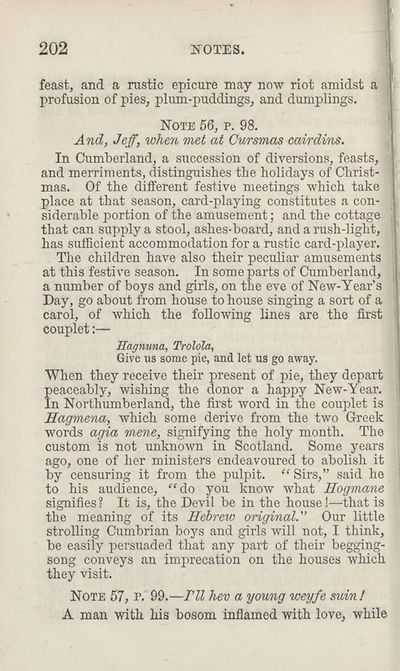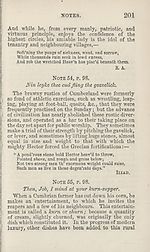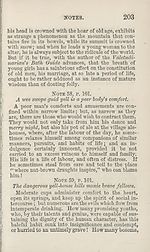Download files
Complete book:
Individual page:
Thumbnail gallery: Grid view | List view

202
NOTES.
feast, and a rustic epicure may now riot amidst a j
profusion of pies, plum-puddings, and dumplings. \
Note 56, p. 98.
And, Jeff, when met at Cursmas cairdins.
In Cumberland, a succession of diversions, feasts, 'j
and merriments, distinguishes the holidays of Christ- I
mas. Of the different festive meetings which take ’
place at that season, card-playing constitutes a con- i
siderable portion of the amusement: and the cottage
that can supply a stool, ashes-board, and a rush-light,
has sufficient accommodation for a rustic card-player. |
The children have also their peculiar amusements i
at this festive season. In some parts of Cumberland,
a number of boys and girls, on the eve of New-Year’s
Day, go about from house to house singing a sort of a
carol, of which the following lines are the first I
couplet:—
Hagnuna, Trolola,
Give us some pie, and let us go away.
When they receive their present of pie, they depart
peaceably, wishing the donor a happy New-Year.
In Northumberland, the first word in the couplet is
Hagmena, which some derive from the two Greek 1
words agia mene, signifying the holy month. The 1
custom is not unknown in Scotland. Some years I
ago, one of her ministers endeavoured to abolish it \
by censuring it from the pulpit. “ Sirs,” said he
to his audience, “do you know what Hogmane ]
signifies? It is, the Devil be in the house!—that is |
the meaning of its Hebrew original." Our little
strolling Cumbrian boys and girls will not, I think,
be easily persuaded that any part of their begging-
song conveys an imprecation on the houses which
they visit.
Note 57, p. 99.—I’ll hev a young weyfe suin /
A man with his bosom inflamed with love, while
NOTES.
feast, and a rustic epicure may now riot amidst a j
profusion of pies, plum-puddings, and dumplings. \
Note 56, p. 98.
And, Jeff, when met at Cursmas cairdins.
In Cumberland, a succession of diversions, feasts, 'j
and merriments, distinguishes the holidays of Christ- I
mas. Of the different festive meetings which take ’
place at that season, card-playing constitutes a con- i
siderable portion of the amusement: and the cottage
that can supply a stool, ashes-board, and a rush-light,
has sufficient accommodation for a rustic card-player. |
The children have also their peculiar amusements i
at this festive season. In some parts of Cumberland,
a number of boys and girls, on the eve of New-Year’s
Day, go about from house to house singing a sort of a
carol, of which the following lines are the first I
couplet:—
Hagnuna, Trolola,
Give us some pie, and let us go away.
When they receive their present of pie, they depart
peaceably, wishing the donor a happy New-Year.
In Northumberland, the first word in the couplet is
Hagmena, which some derive from the two Greek 1
words agia mene, signifying the holy month. The 1
custom is not unknown in Scotland. Some years I
ago, one of her ministers endeavoured to abolish it \
by censuring it from the pulpit. “ Sirs,” said he
to his audience, “do you know what Hogmane ]
signifies? It is, the Devil be in the house!—that is |
the meaning of its Hebrew original." Our little
strolling Cumbrian boys and girls will not, I think,
be easily persuaded that any part of their begging-
song conveys an imprecation on the houses which
they visit.
Note 57, p. 99.—I’ll hev a young weyfe suin /
A man with his bosom inflamed with love, while
Set display mode to:
![]() Universal Viewer |
Universal Viewer | ![]() Mirador |
Large image | Transcription
Mirador |
Large image | Transcription
| Antiquarian books of Scotland > Poetry > Ballads in the Cumberland dialect > (206) |
|---|
| Permanent URL | https://digital.nls.uk/125707687 |
|---|
| Description | Thousands of printed books from the Antiquarian Books of Scotland collection which dates from 1641 to the 1980s. The collection consists of 14,800 books which were published in Scotland or have a Scottish connection, e.g. through the author, printer or owner. Subjects covered include sport, education, diseases, adventure, occupations, Jacobites, politics and religion. Among the 29 languages represented are English, Gaelic, Italian, French, Russian and Swedish. |
|---|

